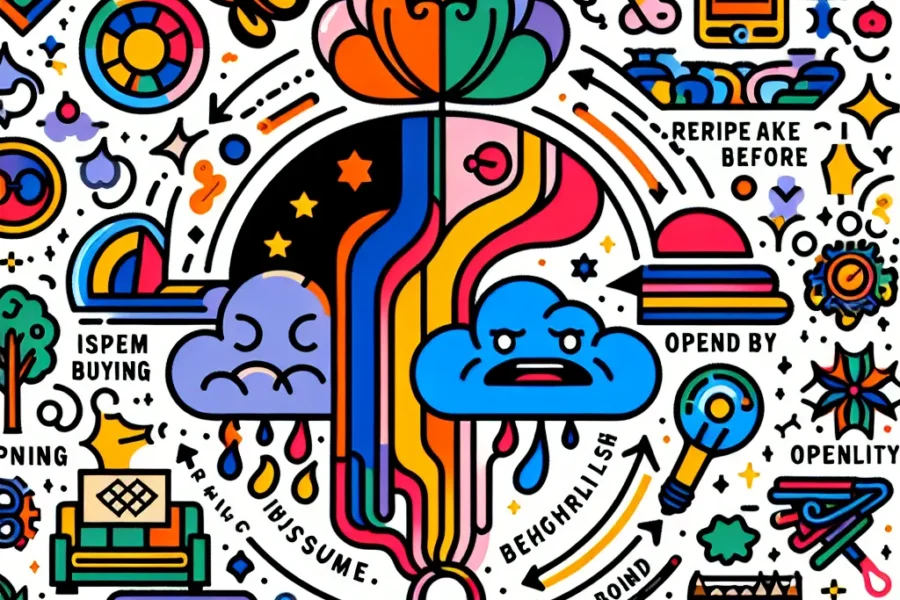Personality and music are intricately linked, reflecting deep aspects of individual character. From the rhythms that make us tap our feet to the melodies that stir our emotions, music has the power to convey aspects of our personalities that sometimes go beyond words. Understanding this relationship can offer enriching insights into how musical preferences can act as a mirror to one’s character.
Music is a universal language that transcends cultural and linguistic barriers. It has the power to soothe, energize, inspire, and console. But on a more personal level, the types of music we gravitate towards can say a lot about who we are. Psychologists and researchers have long been fascinated by the connection between music preferences and personality traits, and numerous studies have been conducted to explore this complex relationship.
The Big Five personality traits—Openness, Conscientiousness, Extraversion, Agreeableness, and Neuroticism (OCEAN)—are commonly used to describe and understand individual differences in personality. Each trait represents a spectrum, and individuals can fall anywhere on the continuum for each trait.
Openness, which characterizes individuals who are open to new experiences and have a broad range of interests, has been linked to a preference for complex, sophisticated, and novel music. People high in openness are more likely to enjoy classical, jazz, blues, and folk music. They are typically seen as imaginative, adventurous, and comfortable with complexity and ambiguity.
Conscientiousness is associated with being organized, reliable, and mindful of details. Those who score high on conscientiousness might prefer music that is more upbeat and conventional. They may be drawn to pop, religious, and country music for its straightforward structure and relatable messages. Conscientious individuals might appreciate music that reflects their structured and goal-oriented nature.
Extraversion is characterized by high levels of energy, sociability, and a tendency to seek stimulation in social settings. Extraverts are often drawn to energetic and rhythmic music that gets them moving and connects them with others. Genres like hip-hop, electronic dance music (EDM), and upbeat pop can be particularly appealing, as they often embody a party-like atmosphere and are commonly experienced in social contexts.
Agreeableness is a trait that indicates a proclivity for cooperation, compassion, and empathy. Those high in agreeableness often enjoy music with positive, uplifting themes. They may favor genres like R&B, soft rock, and singer-songwriter music that emphasize emotions, relationships, and interpersonal connections. The themes of love, understanding, and kindness resonate with agreeable personalities.
Neuroticism, on the other hand, describes individuals who are more prone to experiencing negative emotions such as anxiety, sadness, and instability. People with high neuroticism may find solace in music that reflects their emotional states, such as indie, alternative rock, and genres that include lyrical introspection and emotional catharsis. This music can offer a form of emotional expression and understanding that they might seek.
It is also worth considering the role that music plays in identity formation and social groups. Adolescents and young adults, in particular, often use music as a means to define themselves and create a sense of belonging. The genres and artists they align with can reflect and shape their own self-image and how they wish to be perceived by others. This can be evident in subcultures that form around particular musical scenes, from the punk rock movement to the rave culture associated with EDM.
The emotional impact of music is another facet of how it reflects personality. Research has shown that individuals who prefer complex music, such as jazz or classical, may have higher emotional intelligence. The ability to appreciate the more nuanced and intricate aspects of these genres could correlate with a deeper understanding and awareness of one’s own and others’ emotions.
Moreover, the context in which we listen to music can modulate the relationship between music preferences and personality. For example, someone might typically listen to heavy metal but enjoy calming classical music while studying or working. This adaptability showcases how our musical choices can be versatile and situational, reflecting different facets of our character in varying circumstances.
The interplay between personality and music is also evident in the way people use music in their daily lives. Whether it’s a motivational playlist for a workout session, a carefully curated mixtape for a road trip, or a melancholic score for moments of reflection, the music we choose serves as a soundtrack to our lives, underscoring our experiences and emotions.
Social media and streaming services have further personalized the way we interact with music. With algorithms designed to curate playlists that match our listening habits, these platforms provide a window into our personality by suggesting music that aligns with our previous preferences. They enable a form of musical self-discovery, allowing us to explore genres and artists we might not encounter otherwise.
From a therapeutic perspective, music can be a powerful tool in addressing psychological and emotional challenges. Music therapy uses musical interventions to improve mental health, and a person’s musical preferences can play a significant role in the therapeutic process. By tapping into the music that resonates with a patient’s character, therapists can facilitate self-expression, coping, and healing.
In conclusion, the relationship between personality and music is a dynamic and multifaceted one. Music preferences can reflect and even shape different aspects of our character, from our emotional world to our social identity. By engaging with our favorite genres and exploring new musical territories, we unconsciously express and discover more about ourselves. Music, in its profound and universal appeal, has the unique ability to offer an acoustic mirror to our souls—one that resonates with the intricate rhythms of our individual personalities.



Leave a Comment